Holwell Rifle Club -
First and foremost we are a sports club, just like a cricket or football club. Everything we do is directed towards competitive sport.
The branch of shooting sport which we participate in is Smallbore Rifle and Airgun shooting. In the same way that other sports have particular sets of rules or codes; e.g. Rugby League and Rugby Union; we shoot under the rules issued by the National Smallbore Rifle Association (NSRA).
www.nsra.co.uk
https://www.nsra.co.uk/index.php/home/reference/rules/overview
We are a voluntary club, no one is employed and no one is paid. The club is run by a volunteer committee with the help of the membership.
We own the building and surrounding land, it’s our responsibility. The subscriptions and fees we collect go to maintain and run the club building, provide equipment and support our competition programme.
We are a Community Amateur Sports Club (CASC). This is similar to a charity, you could think of it as “charity lite”. It means that we get some significant tax reductions (not VAT I’m afraid) but our status requires that should we ever wind up the club then the proceeds must go to another CASC, a national governing body; such as the NSRA; or another Charity.
The Legal Bit
This is greatly simplified and only intended as a brief description of the law as it relates to rifle clubs.
The .22 cal. rifles we use are subject to rules contained in the Firearms Act. These rules are contained in Section 1 of the act and thus the rifles are commonly referred to as Section 1 (S1) firearms.
Certain categories of people are deemed unfit to be allowed any access to firearms, either for a fixed period or for life. This is usually due to having been sentenced to a prison term as described at S21 of the Firearms Act. Everyone joining the club has to make a declaration that they are not subject to S21.
To be allowed access to S1 firearms you must hold a Firearm Certificate (FAC) issued by your local police force. This is a problem as you probably don’t have a FAC.
Fortunately Holwell Rifle Club is Home Office Approved which means we are permitted to allow members to use S1 firearms that are the property of the club.
Home Office Approval comes with a long list of conditions that the club must observe and comply with. The main conditions relevant to new members are:
a. All prospective members must make a visit to the club prior to applying for membership.
B. All applicants for membership must make a S21 declaration.
c. The club must provide the police with the name, date and place of birth and address of all applicants.
d. New members must be provided with training in the safe handling of firearms.
e. New members must serve a probationary period before being admitted to full membership.
f. There are some questions that we are required to ask on the application form.
The law that applies to S1 firearms applies equally to ammunition, it too requires a FAC or club membership to acquire it.
The low power airguns; rifles and pistols; that are used for target shooting do not require a FAC. However, they are still classed as firearms, there’s no such thing as “Just an airgun”.
Whilst the law does not stipulate a minimum age for participating in shooting, there are some additional rules that apply to those under 18 years and practical considerations relating to equipment.
Joining and induction process
Our normal procedure is to invite enquirers to visit the club shortly after making initial contact. Then, when we have sufficient numbers; usually 3-
Mon 1900-
Tue 1900-
Wed 1900-
Thu 1900-
Fri 1000-
Sun morning when notified
Training Course Objective and Content
The NSRA probationary course consists of theory and practical range-
The course consists of 10 modules:
Topic
Module P1 Safety and Security
Module P2 Smallbore Rifle and Shooting Equipment
Module P3 Shooting Techniques
Module P4 Loading, Firing and Unloading Procedures
Module P5 Misfire Procedure
Module P6 Scoring the Target
Module P7 The Rifle Sights
Module P8 Zeroing the Sights
Module P9 Preparing and Cleaning the Rifle
Module P10 Introduction to Lightweight Sport Rifle
If time permits we try to include a brief introduction to 10m Air Rifle and Air Pistol shooting.
The practical range work is based upon prone rifle shooting but the aim is to teach core shooting techniques that are applicable to all the shooting disciplines we are able to offer.
Shooting Disciplines
As mentioned above, we usually start training with the Prone Position; i.e. lying down, supporting the rifle with both hands and a “sling”.
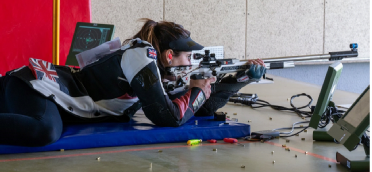
We do this because it is relatively stable and the best position to learn the various elements of shooting technique.
If you follow the link below, it will take you to an article that describes the Prone Position in some detail (more than you require!). It is accurate in most respects and sufficient to gain an impression of the position:
http://www.target-
A modern target rifle (most club rifles are simpler)
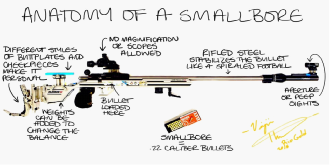
The rifles used are all single shot.
Smallbore rifle is also shot in the Standing and Kneeling Positions. You need to master the basic techniques before moving on to them:
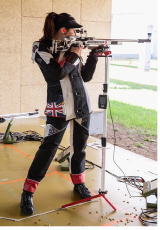
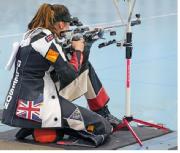
Katie Gleeson – Currently ranked No 42 in the world – Member of Holwell Rifle Club
Benchrest
Although we don’t necessarily cover it as a separate discipline, we do sometimes use it as a teaching method. Sitting behind a table with the rifle rested on an adjustable stand with a telescopic sight might at first sight seem easy. The truth is quite different! Benchrest requires total concentration and the utmost consistency. It is a relatively new discipline in the UK but has attracted a large following very quickly with competitors of all ages. Air rifles may be used alongside cartridge rifles in some competitions, with classes for everything from specialised benchrest rifles to simple sporting rifles.
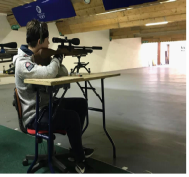
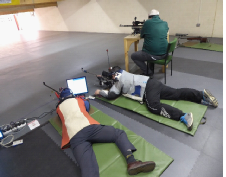
Light Sport Rifle
Light Sport Rifle (LSR) shot standing using a relatively simple rifle. Telescopic sights may be used and some competitions allow the use of air rifles. Unlike prone smallbore rifle a magazine loaded with a maximum of 10 shots may be used.
Typical Light Sport Rifles


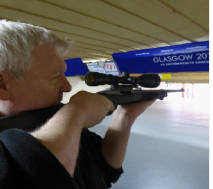
Air Rifle and Pistol
Air rifle and pistol are usually shot a 10m although there is are competitions for air pistol at 20yards. Both disciplines are shot standing unsupported.
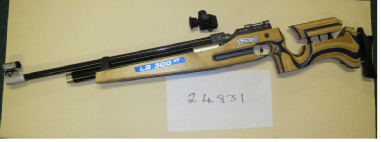
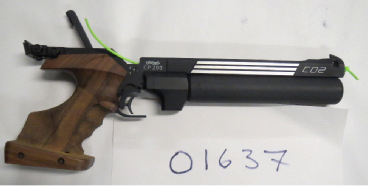
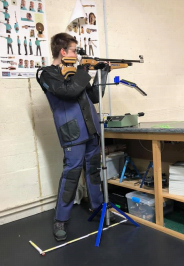
The 10m Range is equipped with electric target changers on 2 firing points and Meyton Electronic Targets on the other 3.
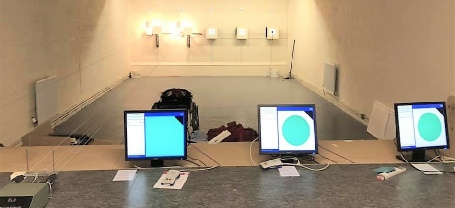
Targets
There are a wide variety of targets used as each discipline has its own:
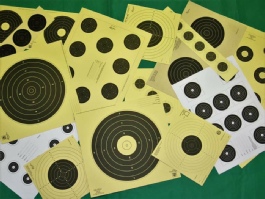
As well as paper targets we have a Meyton Electronic system that serves both the airgun and rimfire range:
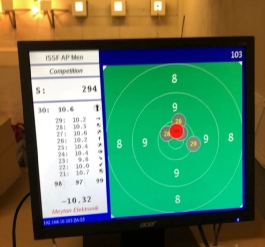
The Meyton targets are configurable for a wide range of target sizes.
As well as the electronic targets we have a SCATT electronic training system:
https://www.scatt.com/scatt-
https://www.scatt.com/videos
One of our SCATT systems is set up in the cartridge range and may be used for live fire.
Equipment
As well as rifles and pistols we have a stock of basic equipment: Jackets, Spotting Scopes and Stands, Slings, Shooting Gloves* and Ear Defenders*.
Covid
*Shooting Gloves: A glove is usually worn on the non-
*Ear Defenders: Another very personal item that is difficult to sanitise thoroughly. If you have a set of your own then you will be asked to bring them along, if you haven’t we will supply you with disposable foam ear plugs.
There is no need to buy any equipment initially, indeed we discourage you from doing so until you have decided which disciplines interest you and we can then advise you on what would be suitable and where to look for it. For major items of equipment there is a large second hand market.
Firearm Certificates
Although it is possible to use a club rifle all the time, most people who intend to continue shooting in the longer term will at some point acquire a rifle(s) of their own. To do this you will have to apply for a Firearm Certificate (FAC) and you will have to have somewhere at home to securely store your rifle. The club is unable to provide storage facilities in other than exceptional short term situations.
To be granted a FAC you must show that you have good reason own a firearm. Target Shooting supported by Full Membership of a rifle club is accepted as a good reason. The Firearms Licencing Department (FLD) will always check an applicant’s membership status and that they have completed a satisfactory probationary period with a supporting record of having attended the club on a regular basis. We are required to keep records for this purpose.
An additional requirement is for the applicant to arrange the provision of a medical report from their General Practitioner. This is not an opinion about your fitness to own firearms but a form that asks about specific conditions and medication.
You will also have to supply details of one or two people who will provide a character reference. Gone are the old days when a bank manager, clergyman or someone of professional standing was specified. Nowadays you need to give details of someone who has known you recently and for at least two years. The criteria that the FLD are seeking is someone who knows you well.
The final stage is a home visit by a Firearms Enquiry Officer (FEO) who goes through the information you have supplied in your application and inspects your proposed security arrangements; a lockable steel cabinet is the basic requirement.
The above is a very brief outline of the FAC application process, if you decide to apply we are able to offer advice and assistance.
Competition
Our competition programme is roughly divided into a winter and summer season, with leagues running over about a 5—6 month period. Most of our competition shooting is conducted as “Postal” leagues, it is an old description whereby targets (usually referred to as “cards”) are shot in one’s own club, witnessed as being shot fairly and are then sent to an independent scorer who scrutinises them and publishes the results. These days there is in fact very little “posting” involved. Targets are more commonly scored by a qualified and nominated club scorer; we have quite a few; and the results emailed to the league organisers or directly inputted to the league website.
The Cambridgeshire Target Shooting Association (CTSA) site is a good example of the latter, hosting many leagues in different disciplines:
https://rifleleagues.co.uk/ctsa
Click the League Results in the lower left panel.
Leagues are a combination of team and individual events, frequently being contested concurrently; i.e. the same score in a round counts for both categories. The most important feature of the individual leagues is that there is no need to be “good enough” to compete, all that is required is some consistency and the desire to improve.
How we go about it.
The first step is to establish the standard of a new shooter and to do this we provide you with a number of cards to shoot in your chosen discipline*. We score these cards, discard the lowest scores and then calculate an Average score. It is this Average that is used when you enter competitions. You will be placed in a Class or Division with shooters who have entered similar averages and thus be shooting against people who are at a similar level. At the completion of a league you will have a new and hopefully better average which may now be used for entries for the subsequent season.
There are also a large number of Open Meetings held throughout the year. These range from club or county sponsored events to National meetings and Championships. Once again, the entries are all based upon submitted averages and if you have the inclination and ambition there is much to occupy you.
Young People and Shooting
As mentioned in the Legal Bit there is no minimum age specified in law for access to firearms. However there is a considerable body of legislation relating to the control of access and supervision of young people when they are permitted to handle them. This even applies on private property, the days when you could allow a young teenager to shoot an airgun unsupervised in the back garden are long gone.
In general, most young people from the age of about 12-
The major issue is that shooting is not easy, in fact it’s quite difficult and for that reason it is important that a young person is ready for the challenge. It is very easy for them to become disheartened and give up, whereas by waiting another 12 months they are more mature and there is a different outcome.
Disability
The club building has level access and is suitable for wheelchair users.
Shooting is one of the very few sports where people of all physical abilities are able to compete on equal terms.
The visually impaired have shown that they are at no disadvantage in the Supported Pistol discipline:
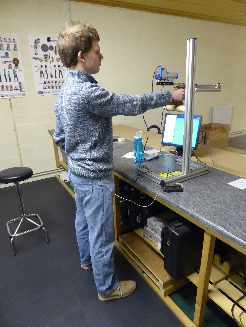
Adjustments to accommodate most physical disabilities may usually be made by means of a simple statement of requirement accompanied by a description and photograph of what is intended. There is usually no need for a medical reference or to be registered disabled.
Subscriptions and Fees
This hasn’t been kept until last in order to hide the painful bit, in fact shooting is a relatively inexpensive hobby at club level.
A note about the figures below:
These are based upon the last subscription and fee levels set almost 12 months prior to Covid appearing on the scene. Since then we have had to weather a year with negligible income but considerable costs. Fortunately, so far we have had sufficient reserves to accommodate this but we shall have to try and rebuild our finances over the next few years. As a result fees will probably have to increase and the figures below should only be seen as a guide.
Annual Subscription (payable 1 April): £80.00
Range Fee (payable on each visit): £3.00
There are discounts for Juniors, Registered Disabled and full time students.
Training Course
Course fee: £50.00 – This includes the first box of 50 rounds of ammunition approx. £4.50
If on completion of the course you decide to continue with membership of the club you will receive £20.00 off a full year’s membership subscription.
Family Membership: 2 adults paying the full membership subscription will be entitled free junior membership for a third member of the family.
Holwell Sports and Social Club (The Stute): We maintain a relationship with Holwell Sports and Social Club (HSSC) and invite all our members to consider joining HSSC. This is voluntary, there is no obligation to do so. The current HSSC subscription is £15.00 payable 1 Jan.
Other costs
No charge is made for the use of club equipment, but you may not be guaranteed exclusive use of any particular item; Covid procedures permitting.
Ammunition is sold in boxes of 50 rounds at prices ranging from £4.50 -
.177 target airgun pellets are available in tins of 500.
Targets for practice and training cost between 0.05 – 0.10 each dependant on type.
Competition Fees
The entry fees for most competitions are included in the annual subscription. All we ask is that if you enter a competition you complete it.
A small number of the larger national individual competitions such as the annual NSRA – Eley are not covered and you will need to pay for these.
Targets for all competitions are provided.